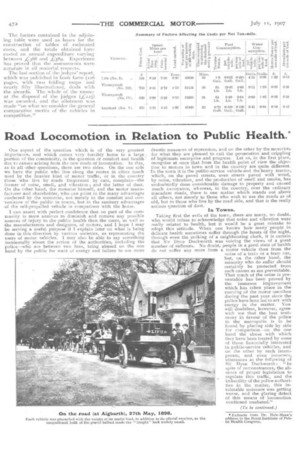Road Locomotion in Relation to Public Health.'
Page 16

If you've noticed an error in this article please click here to report it so we can fix it.
One aspect of the question which is of the very greatest :importance, and which comes very forcibly home to a large portion of the community, is the question of comfort and health due to causes arising from th?, new mode of locomotion. In this, as in all other questions, there are two sides. On the one side we have the public who live along the routes in cities much used by the heavier kind of motor traffic, or in the country those who live by roads frequented by cars, complain—the former of noise, smell, and vibration ; and the latter of dust. On the other hand, the motorist himself, and the motor manufacturer and shareholder, who can point to the many advantages conferred by the motorcar, not merely in the comfort and convenience of the public in towns, but in the sanitary advantages of the self-propelled vehicle in comparison with the horse.
I can assert with perfect confidence that no part of the community is more anxious to diminish and remove any possible sources of injury to the public health than the users, as well as the manufacturers and designers, of motors, and I hope I may be serving a useful purpose if I explain later on what is being done in this direction by various societies, as representing the users of motor vehicles. I may also be able to say something incidentally about the action of the authorities, including the police—who are between two fires, being abused on the one hand by the public for want of energy and failure to use more drastic measures of repression, and on the other by the motorists for what they are pleased to call the persecution and crippling of legitimate enterprise and progress. Let us, in the first place, recognise at once that from the health point of view the objection to motors in town and in the country are quite different. In the town it is the public-service vehicle and the heavy tractor, which, on the paved streets, even streets paved with wood, by noise, vibration, and the production of smell and smoke, has undoubtedly done considerable damage to property and caused much annoyance, whereas, in the country, over the ordinary macadam roads, there is one matter which stands out above all others, not merely to those who wish to use the roads as of old, but to those who live by the road side, and that is the really ser,ious question of dust.
In Towns.
Taking first the evils of the town, there are many, no doubt, who would refuse to acknowledge that noise and vibration were really related to health, but it would be a great mistake to adopt this attitude. When one knoWs how many people in delicate health sometimes suffer through the hours of the night, through even the striking of a neighbouring clock, it is certain that Sir Dyce Duckworth was voicing the views of a great number of sufferers. No doubt, people in a good state of health do not suffer any more from a motor vehicle than from the noise of a train or a tram car,
but, on the other hand, the
minority who do suffer should certainly be protected from such causes as are preventable. That much of the noise is preventable has beets proved by the immense improvement which has taken place in the running of the motor omnibus during the past year since the police have been led to act with energy in the matter. You will doubtless, however, agree with me that the best testimony in favour of the police in the metropolis is to he found by placing side by side for comparison—on the one hand the abuse with which they have been treated by some of those financially interested in public-service vehicles, and C.1 n the other by such intemperate, and even incorrect, utterances as the following of Sir Dyes Duckworth : "In spite of remonstrances, the absence of proper legislation to regulate this traffic, and the imbecility of the police authorities in the matter, this intolerable nuisance was getting worse, and the glaring defect of this means of locomotion continued unabated."






















